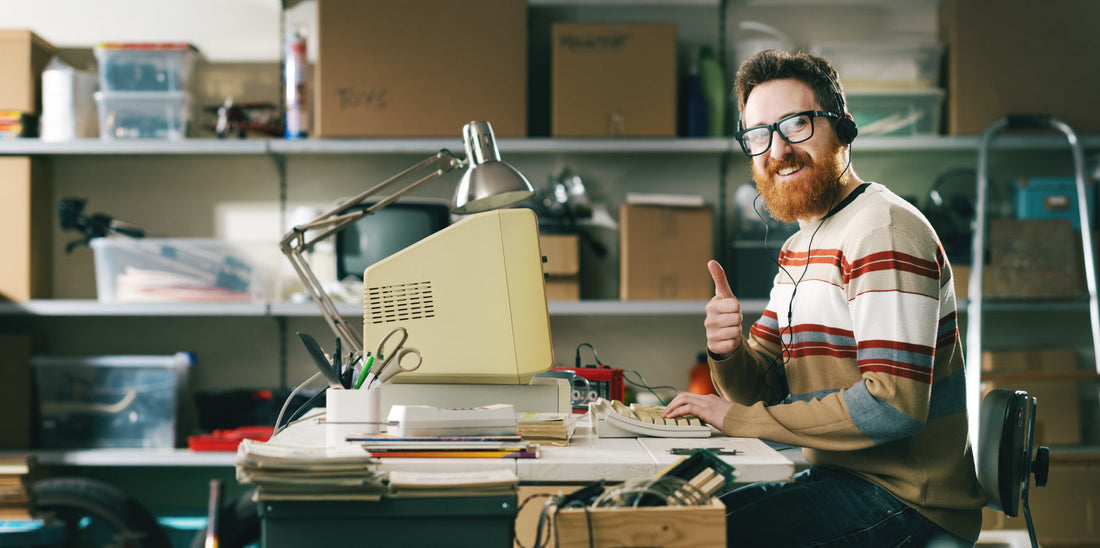
SPEEDING UP AN OLD PC
Share

A slow computer can become a real test of patience in everyday life. Programs start sluggishly, the browser freezes, and the system takes minutes to boot up. But that doesn’t always mean you need a new device.
Old PCs can often be noticeably accelerated with simple methods. In this article, you’ll learn how to make your old PC faster through smart settings, targeted software tips, and meaningful hardware upgrades. All tips are beginner-friendly and explained clearly, so you can get started even without technical knowledge.
Why does a PC slow down over time?
New software, especially demanding 3D games, puts a heavy load on hardware—older computers can’t keep up. But there are other reasons for a slow PC:
- Too many programs running simultaneously
- Outdated hard drives
- Too little RAM
- Outdated software or drivers
- Malware or background processes
The good news: All of these issues can be resolved—some even for free and with little effort.
Software optimization: More speed with a few clicks
With proper software maintenance, you can regain some speed. You should perform these tasks regularly:
- Disable startup programs: Many applications start automatically with the system and slow down your PC. Open the Task Manager with Ctrl + Shift + Esc, switch to the “Startup” tab, and disable unnecessary programs. Be aware that after disabling these programs, some apps or devices may no longer function properly—in that case, simply re-enable them. Also, remove unnecessary software entirely.
- Keep system and software up to date: Updates not only fix security vulnerabilities but also improve performance. Regularly check under “Settings > Windows Update” for available updates. Also check for updated drivers for your graphics card—they often fix performance issues in new games.
- Run a malware scan: Malware can significantly slow down your PC. Run a full virus scan with Windows Defender or another antivirus program. Overly cautious malware scanners that constantly run in the background can also slow down your system.
However, don’t expect miracles from so-called tuning programs that promise “more performance with one click”—these are usually empty promises.
Don’t forget physical maintenance
Hardware also needs care. Dust and heat can impair performance if they prevent proper cooling of the CPU and GPU, causing the system to throttle performance.
- Clean the case, fans, and heatsinks regularly with compressed air or a brush
- Ensure good ventilation at your workspace. Avoid placing the PC in an enclosed cabinet or using a laptop on cushions or blankets, as it typically draws cooling air from underneath. Instead, use a laptop stand.
Unlock new performance with hardware upgrades
Some components can be replaced with relatively little effort and offer great benefits.
- SSD instead of HDD: Replacing a mechanical hard drive with a solid-state drive is the most effective way to speed up an old PC. Boot times and program launches are drastically reduced. Usually, a fresh installation of the operating system is required.
- More RAM: Too little RAM causes stuttering and long loading times. 8 GB is the minimum standard today; 16 GB is optimal for multimedia or office work with many open apps and browser tabs.
- Upgrade CPU and GPU: This is especially worthwhile for gaming or resource-intensive applications. Make sure the new components are compatible with your motherboard.
Additional performance tips
- Defragment HDDs: Traditional hard drives can benefit from regular defragmentation, though the effect is minor. SSDs should not be defragmented.
- Reinstall Windows: A clean reinstallation can clear out old systems and remove clutter or viruses. Don’t forget to back up your data!
- Correct BIOS settings: Incorrect BIOS/UEFI settings can unnecessarily slow the system, e.g. when using USB drives, during boot, or with modern SSDs.
- BIOS update: Some motherboards gain new functions or performance improvements through a BIOS update. Only perform the update if the manufacturer recommends it.
Questions and answers about PC tuning
Which program makes the PC faster?
Programs like CCleaner, BleachBit, or the built-in Windows Disk Cleanup help clean up your system, but they don’t unleash much performance. Startup managers like Autoruns (by Microsoft) provide more control. Important: Only trust reputable tools and avoid so-called “speed boosters” from unknown sources.
How can I speed up my PC for free?
With software optimizations like disabling startup programs and updating apps, you can boost performance without spending a cent. A fresh Windows installa
